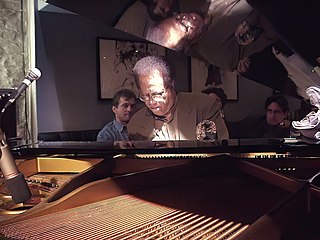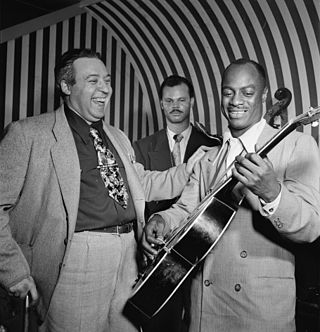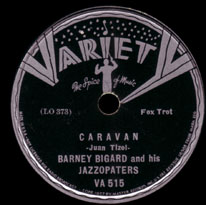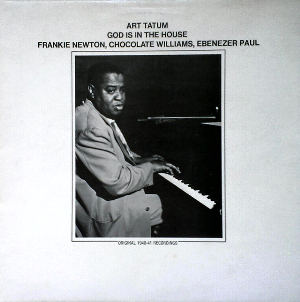Related Research Articles

Arthur Tatum Jr. was an American jazz pianist who is widely regarded as one of the greatest ever. From early in his career, fellow musicians acclaimed Tatum's technical ability as extraordinary. Tatum also extended jazz piano's vocabulary and boundaries far beyond his initial stride influences, and established new ground through innovative use of reharmonization, voicing, and bitonality.
The 16th Annual Grammy Awards were held March 2, 1974, and were broadcast live on American television. They recognised accomplishments by musicians from the year 1973.

Cedar Anthony Walton Jr. was an American hard bop jazz pianist. He came to prominence as a member of drummer Art Blakey's band, The Jazz Messengers, before establishing a long career as a bandleader and composer. Several of his compositions have become jazz standards, including "Mosaic", "Bolivia", "Holy Land", "Mode for Joe" and "Ugetsu/Fantasy in D".

Lloyd "Tiny" Grimes was an American jazz and R&B guitarist. He was a member of the Art Tatum Trio from 1943 to 1944, was a backing musician on recording sessions, and later led his own bands, including a recording session with Charlie Parker. He is notable for playing the electric tenor guitar, a four-stringed instrument.
"Memories of You" is a popular song about nostalgia with lyrics written by Andy Razaf and music composed by Eubie Blake and published in 1930.

"Caravan" is an American jazz standard by Juan Tizol and Duke Ellington, first performed by Ellington in 1936. Irving Mills wrote lyrics, but they are rarely sung. The song has regained popularity since being featured prominently in the 2014 film Whiplash.
"Yesterdays" is a 1933 song about nostalgia composed by Jerome Kern with lyrics by Otto Harbach. They wrote the song for Roberta, a musical based on the novel Gowns by Roberta by Alice Duer Miller. "Yesterdays" was overshadowed by the musical's more popular song, "Smoke Gets in Your Eyes", which was a number one hit for the Paul Whiteman orchestra.

Louis Armstrong Plays W. C. Handy is a 1954 studio release by Louis Armstrong and His All Stars, described by Allmusic as "Louis Armstrong's finest record of the 1950s" and "essential music for all serious jazz collections". Columbia CD released the album on CD in 1986 in a much altered form, with alternative versions in place of many of the original songs, but restored the original with its 1997 re-issue, which also included additional tracks: a brief interview by the producer, George Avakian, with W. C. Handy; a joke told by Louis Armstrong; and several rehearsal versions of the songs.
"In a Mellow Tone", also known as "In a Mellotone", is a 1939 jazz standard composed by Duke Ellington, with lyrics written by Milt Gabler. The song was based on the 1917 standard "Rose Room" by Art Hickman and Harry Williams, which Ellington himself had recorded in 1932. Howard Stern used a recording of this song as the opening theme to The Howard Stern Show from 1987 to 1994.
"Stompin' at the Savoy" is a 1933 jazz standard composed by Edgar Sampson. It is named after the famed Harlem nightspot the Savoy Ballroom in New York City.

St. Louis Blues is a 1958 American film broadly based on the life of W. C. Handy. It stars jazz and blues greats Nat "King" Cole, Pearl Bailey, Cab Calloway, Ella Fitzgerald, Eartha Kitt, and Barney Bigard, as well as gospel singer Mahalia Jackson and actress Ruby Dee. The film's soundtrack uses over ten of Handy's songs, including the title song. In conjunction with the film, Cole recorded an album of W. C. Handy compositions, arranged by Nelson Riddle, and Fitzgerald incorporated "St. Louis Blues" into her concert repertoire.

Piano Blues is a 2003 documentary film directed by Clint Eastwood as the seventh installment of the documentary film series The Blues produced by Martin Scorsese. The film features interviews and live performances of piano players Ray Charles, Dave Brubeck, Dr. John and Marcia Ball.

Love, Gloom, Cash, Love is the last album as leader by jazz pianist Herbie Nichols, featuring performances recorded in 1957 and released on the Bethlehem label in 1958. “Infatuation Eyes” is a solo piano piece paying tribute to Art Tatum, who died in November 1956.
Alice Leslie Carter was an American classic female blues singer, active as a recording artist in the early 1920s. Her best-known tracks are "Decatur Street Blues" and "Aunt Hagar's Children Blues". She was a contemporary of the better-known recording artists Ma Rainey, Bessie Smith, Clara Smith, Victoria Spivey, Sippie Wallace, and Bertha "Chippie" Hill. Little is known of her life outside music.

The Smithsonian Collection of Classic Jazz is a six-LP box set released in 1973 by the Smithsonian Institution. Compiled by jazz critic, scholar, and historian Martin Williams, the album included tracks from over a dozen record labels spanning several decades and genres of American jazz, from ragtime and big band to post-bop and free jazz.
Claxtonola was a jazz record label founded in 1918 by the Brenard Manufacturing Company in Iowa City, Iowa. It reissued Paramount, Black Swan, and Gennett Records masters on the Claxtonola and National labels. The label closed in 1925. The company also sold phonographs.
The Genius of Art Tatum is a 1953-54 series of solo albums by jazz pianist Art Tatum originally issued on LP over 11 volumes. First released on the Clef Records label, they were added to the Grammy Hall of Fame in 1978. A 7-CD box-set of these recordings, now under the title of The Complete Pablo Solo Masterpieces, was issued on the Pablo label in July 1991.
Chocolate Williams was an American jazz bassist and vocalist based in New York City. He was a prolific performer of jazz, and, notably, performed and recorded with Art Tatum in 1941 and Herbie Nichols in 1952.

God Is in the House is an album by pianist Art Tatum. It is a collection of informally recorded club performances from 1940 and 1941, and was first released by Onyx Records in 1973. It won two Grammy Awards.
References
- ↑ "Aunt Hagar's Blues". Jazzstandards.com. Retrieved 13 December 2012.
- ↑ Williams, Martin (1983). "Art Tatum: Not for the Left Hand Alone". American Music. 1 (1): 36–40. doi:10.2307/3051572. JSTOR 3051572.